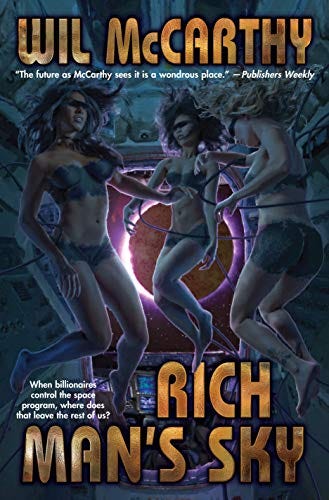SF/F Review Double Feature – Rich Man's Sky, and Poor Man's Sky
Rich Man's Sky, by Wil McCarthy
and
Poor Man's Sky, by Wil McCarthy
Synopsis: In the near future, humanity takes the first steps to creating off-Earth colonies. In Rich Man's Sky, government agents are sent to infiltrate (and possibly capture) a rapidly-expanding solar-harvesting factory at L1. In Poor Man's Sky, a detective (and ex-Navy Seal) is sent to the toe-hold Lunar Station to investigate the first off-Earth murder.
Books Review: This is a single review because these novels aren't just stories, they are a thorough exploration of how, actually literally in real life, we might get off this planet. They take place in the very near future (RMS opens in 2051, less than 30 years from now). All the tech used is either already available, already in prototype, or a single-step extrapolation of such and realistically possible. Wil McCarthy is an actual rocket scientist, formerly from Lockheed Martin.
The primary movers in Rich Man's Sky are mega-wealthy entrepenuers. There is an obvious Elon Musk stand-in, having taken the SpaceX stand-in to its final form. There's a Richard Branson equivalent, trying to keep up but aging out. There's a ruthless Russian oligarch that controls the off-world Helium-3 trade, who I'm sure has a current-day analog that I would recognize if I knew anything about IRL Russian oligarchs. I, too, think the most likely way we'll get humans living off-planet is via private actors.
The political ramifications of these expansions into space are a major source of narrative conflict. The governments of the world are pissed off, but they don't have the ability to do much expanding of their own. They do, however, have the power to really bring the hammer down planet-side, and to send elite agents into space. This also seems like an extremely plausible forecast.
Interestingly, the Catholic Church has a stake in a small Lunar station/monestary. The really fascinating part is how convincingly McCarthy portrays the Church's motivations for doing this, and how they'd execute on it. A nice touch!
The first book (Rich Man's Sky) has a main plot line of spy-thriller espionage. The second book (Poor Man's Sky) is a murder-mystery. They share quite a few characters in common, but each one can be read completely stand alone without needing to read the other. They are fully self-contained stories. In this way, they remind me a lot of the early MCU, when each movie stood on its own merits and didn't assume any outside knowledge from the viewer, but which all existed in a single internally-consistent universe which grew richer with each addition. I really like this model. Come to think of it, it reminds me of Discworld as well, in that structure.
While both of the books have strong primary plots, and likable protagonists with real depth, they have a quirk to their structure. Probably over a third of the page count of both these novels isn't really focused on the primary plot or protagonist. This is because they aren't just novels telling a story... they really are thorough explorations of how we might get off this planet. This means there are many short side-chapters that focus on how current tech could mature to make space travel feasible. Or the social impacts these advancements bring. Or how the economy of off-world energy trade finds an equilibrium, and then how it reacts to sudden supply shocks. Or how the most powerful people in the world interact with menial laborors when they live next door to each other.
For me, and for people like me who are really excited into seeing a possible road to off-world colonization actually being fully thought through and put on paper, this is absolutely fantastic. It answers "OK, but how the hell do we get to Star Trek from here? How can I see myself personally, or my friends and neighbors, actually doing this?" It's wonderful and inspiring, and I love it. But for anyone who isn't into all that stuff, this will be a drag. It'll probably be very boring for them, and feel like meaningless world-building that doesn't advance the plot or develop character. These books are probably not for people like them, and so I wouldn't recommend it for anyone who thinks this sounds lame.
For myself, and people like me, though -- Highly Recommended!
Book Club Review? n/a. This was not read in book club, I was reading it in my spare time. Please see Conflict of Interest, below.
Potential Conflict of Interest: I know Wil McCarthy personally. I think he's a great guy. He's also in my monthly Writer's Workshop group, which is why I have already read Poor Man's Sky -- I was a beta reader for it. PMS isn't in print yet, and you can't buy it at the time of this publication. I know that this colors my reading of his books, it would be impossible for it not to, and I would laugh at anyone who claimed otherwise.
That being said, I really do think these are very good novels, and people who are also excited about current tech advances and about getting us off this rock would really like them as well. I do still have some ability to see bad writing, even when it comes from my friends, and in those cases I don't write blog posts saying otherwise. I do value my reputation a little. :) Also I can't be too terribly off track, because Rich Man's Sky is a finalist for the 2022 Prometheus Award For Best Novel. So there.




